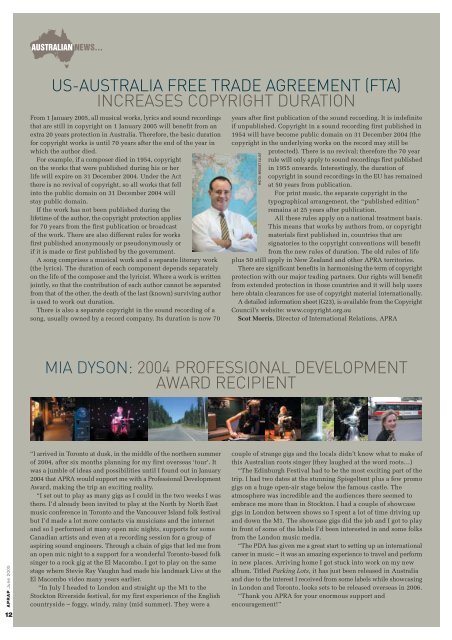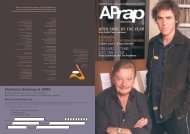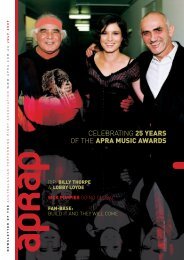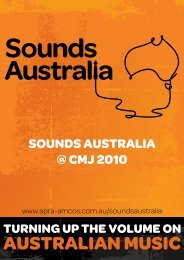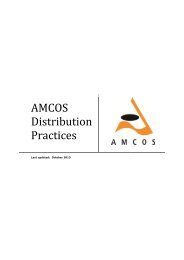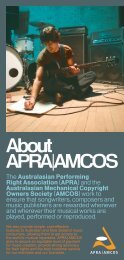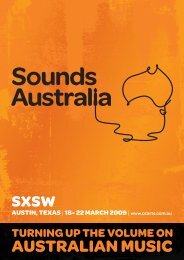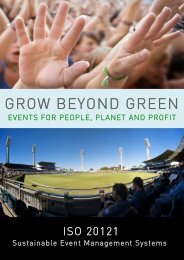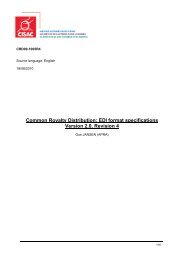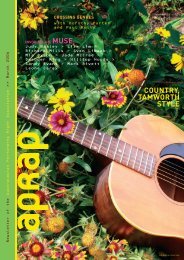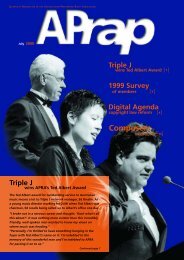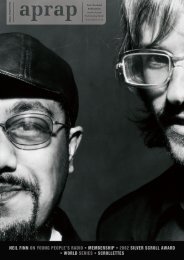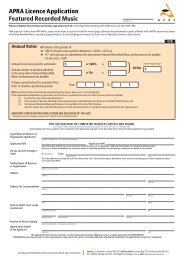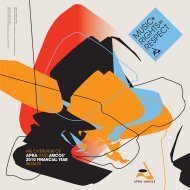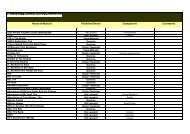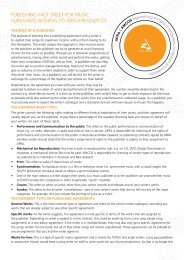Create successful ePaper yourself
Turn your PDF publications into a flip-book with our unique Google optimized e-Paper software.
AUSTRALIAN NEWS…<br />
US-AUSTRALIA FREE TRADE AGREEMENT (FTA)<br />
INCREASES COPYRIGHT DURATION<br />
From 1 January 2005, all musical works, lyrics and sound recordings<br />
that are still in copyright on 1 January 2005 will benefit from an<br />
extra 20 years protection in Australia. Therefore, the basic duration<br />
for copyright works is until 70 years after the end of the year in<br />
which the author died.<br />
For example, if a composer died in 1954, copyright<br />
on the works that were published during his or her<br />
life will expire on 31 December 2004. Under the Act<br />
there is no revival of copyright, so all works that fell<br />
into the public domain on 31 December 2004 will<br />
stay public domain.<br />
If the work has not been published during the<br />
lifetime of the author, the copyright protection applies<br />
for 70 years from the first publication or broadcast<br />
of the work. There are also different rules for works<br />
first published anonymously or pseudonymously or<br />
if it is made or first published by the government.<br />
A song comprises a musical work and a separate literary work<br />
(the lyrics). The duration of each component depends separately<br />
on the life of the composer and the lyricist. Where a work is written<br />
jointly, so that the contribution of each author cannot be separated<br />
from that of the other, the death of the last (known) surviving author<br />
is used to work out duration.<br />
There is also a separate copyright in the sound recording of a<br />
song, usually owned by a record company. Its duration is now 70<br />
years after first publication of the sound recording. It is indefinite<br />
if unpublished. Copyright in a sound recording first published in<br />
1954 will have become public domain on 31 December 2004 (the<br />
copyright in the underlying works on the record may still be<br />
protected). There is no revival; therefore the 70 year<br />
rule will only apply to sound recordings first published<br />
in 1955 onwards. Interestingly, the duration of<br />
copyright in sound recordings in the EU has remained<br />
at 50 years from publication.<br />
For print music, the separate copyright in the<br />
typographical arrangement, the “published edition”<br />
remains at 25 years after publication.<br />
All these rules apply on a national treatment basis.<br />
This means that works by authors from, or copyright<br />
materials first published in, countries that are<br />
signatories to the copyright conventions will benefit<br />
from the new rules of duration. The old rules of life<br />
plus 50 still apply in New Zealand and other APRA territories.<br />
There are significant benefits in harmonising the term of copyright<br />
protection with our major trading partners. Our rights will benefit<br />
from extended protection in those countries and it will help users<br />
here obtain clearances for use of copyright material internationally.<br />
A detailed information sheet (G23), is available from the Copyright<br />
Council’s website: www.copyright.org.au<br />
Scot Morris, Director of International Relations, APRA<br />
PHOTO: BRIDGET ELLIOT<br />
MIA DYSON: 2004 PROFESSIONAL DEVELOPMENT<br />
AWARD RECIPIENT<br />
<strong>APRAP</strong> <strong>June</strong> 2005<br />
12<br />
“I arrived in Toronto at dusk, in the middle of the northern summer<br />
of 2004, after six months planning for my first overseas ‘tour’. It<br />
was a jumble of ideas and possibilities until I found out in January<br />
2004 that APRA would support me with a Professional Development<br />
Award, making the trip an exciting reality.<br />
“I set out to play as many gigs as I could in the two weeks I was<br />
there. I’d already been invited to play at the North by North East<br />
music conference in Toronto and the Vancouver Island folk festival<br />
but I’d made a lot more contacts via musicians and the internet<br />
and so I performed at many open mic nights, supports for some<br />
Canadian artists and even at a recording session for a group of<br />
aspiring sound engineers. Through a chain of gigs that led me from<br />
an open mic night to a support for a wonderful Toronto-based folk<br />
singer to a rock gig at the El Macombo, I got to play on the same<br />
stage where Stevie Ray Vaughn had made his landmark Live at the<br />
El Macombo video many years earlier.<br />
“In July I headed to London and straight up the M1 to the<br />
Stockton Riverside festival, for my first experience of the English<br />
countryside – foggy, windy, rainy (mid summer). They were a<br />
couple of strange gigs and the locals didn’t know what to make of<br />
this Australian roots singer (they laughed at the word roots…)<br />
“The Edinburgh Festival had to be the most exciting part of the<br />
trip. I had two dates at the stunning Spiegeltent plus a few promo<br />
gigs on a huge open-air stage below the famous castle. The<br />
atmosphere was incredible and the audiences there seemed to<br />
embrace me more than in Stockton. I had a couple of showcase<br />
gigs in London between shows so I spent a lot of time driving up<br />
and down the M1. The showcase gigs did the job and I got to play<br />
in front of some of the labels I’d been interested in and some folks<br />
from the London music media.<br />
“The PDA has given me a great start to setting up an international<br />
career in music – it was an amazing experience to travel and perform<br />
in new places. Arriving home I got stuck into work on my new<br />
album. Titled Parking Lots, it has just been released in Australia<br />
and due to the interest I received from some labels while showcasing<br />
in London and Toronto, looks sets to be released overseas in 2006.<br />
“Thank you APRA for your enormous support and<br />
encouragement!”


